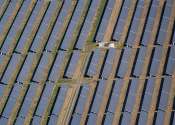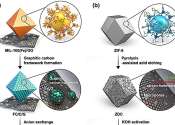Innovative wireless light switch could cut house wiring costs in half
A University of Alberta engineering researcher has developed a wireless light switch that could reduce the cost of wiring a house by as much as 50%.
Nov 28, 2023
6
464
Electronics & Semiconductors

A University of Alberta engineering researcher has developed a wireless light switch that could reduce the cost of wiring a house by as much as 50%.
Nov 28, 2023
6
464
Business

One argument put forward in defense of fossil fuels is that they were a historical necessity, because there was no other viable substitute for much of the 20th century. We owe fossil fuels a debt of gratitude, the argument ...
Oct 14, 2023
4
929
Engineering

There's a patch of concrete on Drexel University's campus that could portend a frost-free future for sidewalks and highways in the Northeast.
Mar 18, 2024
0
1012
Energy & Green Tech

Imagine a household that consumes 1,000 kilowatt hours of energy per month. Then they install solar panels on their roof that generate 500 kilowatt hours of electricity per month on average. How much should their consumption ...
Nov 20, 2023
12
212
Hi Tech & Innovation

Artificial intelligence not only affords impressive performance, but also creates significant demand for energy. The more demanding the tasks for which it is trained, the more energy it consumes.
Sep 8, 2023
0
968
Energy & Green Tech

What does it take to produce green hydrogen more efficiently and cheaply? Apparently, small ruthenium particles and a solar-powered system for water electrolysis. This is the solution proposed by a joint team involving the ...
Dec 13, 2023
5
279
Energy & Green Tech

The extent to which renewables should dominate Australia's energy grids is a major issue in science and politics. Solar and wind are clearly now the cheapest form of electricity. But limits to these technologies can undermine ...
Jul 22, 2024
0
86
Energy & Green Tech

The sun's energy is effectively limitless. While resources such as coal or gas are finite, if you are able to capture and use solar power it doesn't prevent anyone else from also using as much sunshine as they need.
Jan 9, 2024
0
122
Energy & Green Tech

Sodium (Na), which is over 500 times more abundant than lithium (Li), has recently garnered significant attention for its potential in sodium-ion battery technologies. However, existing sodium-ion batteries face fundamental ...
Apr 19, 2024
0
196
Energy & Green Tech

By installing a heat pump in his house in the hills of Oslo, Oyvind Solstad killed three birds with one stone, improving his comfort, finances and climate footprint.
Oct 29, 2023
0
27
In physics, energy (from the Greek ἐνέργεια - energeia, "activity, operation", from ἐνεργός - energos, "active, working") is a scalar physical quantity that describes the amount of work that can be performed by a force, an attribute of objects and systems that is subject to a conservation law. Different forms of energy include kinetic, potential, thermal, gravitational, sound, light, elastic, and electromagnetic energy. The forms of energy are often named after a related force.
Any form of energy can be transformed into another form, but the total energy always remains the same. This principle, the conservation of energy, was first postulated in the early 19th century, and applies to any isolated system. According to Noether's theorem, the conservation of energy is a consequence of the fact that the laws of physics do not change over time.
Although the total energy of a system does not change with time, its value may depend on the frame of reference. For example, a seated passenger in a moving airplane has zero kinetic energy relative to the airplane, but non-zero kinetic energy relative to the Earth.
This text uses material from Wikipedia, licensed under CC BY-SA